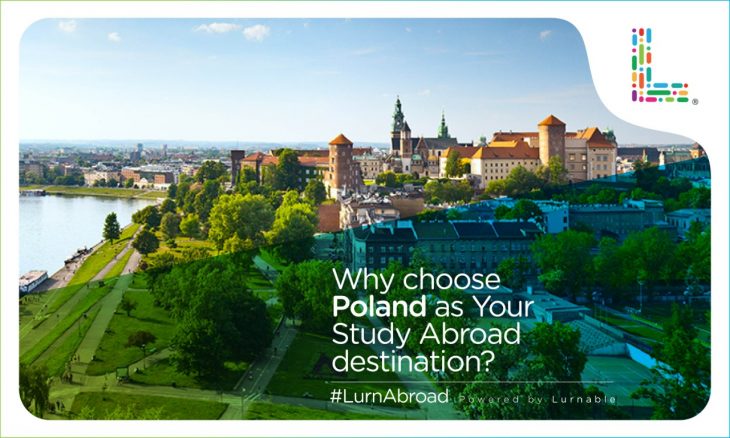When it comes to studying abroad in Europe, there are plenty of low-cost options to explore. While you can study in the countries on a budget, you need not worry about compromising the quality of education. We have already covered Germany in this series and talked about it being one of the most affordable destinations for international students. Next on our checklist is Poland, where you get an unmatched combination of high-quality universities, affordable tuition fees, low living costs, and vibrant cultural life.
Known as the Land of Pierogi and Potatoes, Poland is loved for its serene beauty and diverse culture. It is the sixth-largest economy in the EU and houses the largest stock exchange in the east-central part of the continent. The opportunities will never end if you choose the country as your study abroad destination. Let us share in detail some valid reasons for the choice.
WORLD-CLASS UNIVERSITIES
Poland has over 450 higher education institutions, which gives you lots of choices as an international student. The Polish education system is based on the high standards set by the Bologna process, bringing international recognition for the degrees availed here. The academic institutions in the country prioritise creative skills and practical knowledge over theoretical knowledge. The best thing about choosing Poland as your destination is that you get endless options in short-term and full-time programmes here. Here are the top universities you can explore.
- University of Warsaw
- Nicholas Copernicus University
- Warsaw University of Technology
- Jagiellonian University
- University of Gdansk
- University of Wroclaw
CHOICES IN STUDY ABROAD PROGRAMMES
As an international student, you can explore more than 400 courses in English. Many of these are at an undergraduate level. The choices in academic fields are extensive. Warsaw University ranks as number one in the Top Coder international IT ranking, leaving behind prestigious American universities. Poland is also renowned for its medical schools, which are attracting international students in large numbers. The leading universities here also offer high-quality programmes in medicine, engineering, business, finance, and humanities, and the best part is that they are taught in English.
AFFORDABLE TUITION FEES
Poland is an excellent choice for European citizens because you can study here for zero tuition fees. For non-European students, tuition fees apply, but you need not worry because they are much lower than other popular study destinations in Europe. You can expect to pay 7,000-8,000 USD for a Bachelor’s degree, while a Master’s degree can cost up to 9,000 USD. However, costs may run higher for programmes in medicine and dentistry and MBA degrees. Additionally, you will need to pay more if you choose to study in one of the private Polish institutions.
SCHOLARSHIPS
Apart from affordable tuition fees in Polish universities, you have another valid reason to choose it as your study abroad destination. There are multiple scholarships from the government, universities, and private foundations you can explore. Here are some of them:
- The Gen. Anders Scholarship
- The Bilateral Cooperation Exchange Scholarship
- The Poland My First Choice Scholarship
- The POLONISTA Scholarship and Fellowship
- The Visegrad Scholarship
- The Stefan Banach Scholarship
- The Eastern Partnership Scholarships for post-soviet countries
Assistance may depend on several factors, such as your citizen status and course chosen. You can find details from the university you seek to get into.
COST OF LIVING
A few European countries come close to Poland in terms of affordability. While you get the benefits of low tuition fees and scholarships here, the low cost of living also makes it a favourable destination for studying abroad. The country is still going through an economic development process, so the cost of living is relatively lower than its European counterparts. You require only around 500 USD for monthly accommodation, food, and transport expenses. You may even get a student discount on your monthly transportation card.
VISA REQUIREMENTS
The student visa process depends on your citizenship status. If you are a European national, you will only need a valid travel document to stay here for your studies. It could be your passport or an ID card from your home country. No formal requirements apply if you stay for less than a 90-day period. But you will have to register your residence in one of the 16 administrative divisions because your stay will probably be longer than three months. A visa is required for non-European citizens, though citizens from some countries are exempt from the requirements when entering the Schengen Area. There are two types of visas for international students- Visa C for a stay of 90-180 days and Visa D for up to one year. For a longer stay, you will require a Temporary Residence Permit/Card. You will get it for 15 months and can renew it for up to 3 years, but not longer than the completion of your studies.
STUDY AND WORK OPPORTUNITIES
International students from EU/EEA countries can work in Poland without needing a work permit. Non-EU citizens can work if they have a valid residency permit. But finding employment without Polish language skills can be challenging. The remuneration for student jobs is generally low, around £2 per hour with a limit of 20 hours a week. It may be feasible to return to your home country during summer breaks because you may not want to incur the cost of living without a work opportunity.
POST-STUDY WORK VISA
If you want to stay back and work in Poland after your studies are over, you will need a work permit. A student visa will not suffice, and formalities by the employer are essential as mandatory proof. You can stay back after graduation but only with an extension in your Stay Back permit. Once again, rules differ for EU and EEA citizens and non- EU and EEA citizens. The former have to apply for a post-study visa at a local administrative office. As a part of the process, you will need to give valid proof validating the healthcare and financial cost-bearing ability. Non-EU and EEA citizens have to apply for a long-term visa. You will need to do it at your local Polish embassy or consulate.
Studying abroad in Poland brings the opportunity to get top-notch education along with a slice of European culture, all without spending a fortune. So go ahead and explore your options.

If you are considering studying abroad why don’t you discuss your prospects and opportunities with experts at Lurnable’s dedicated study abroad counselling division LurnPathways?






